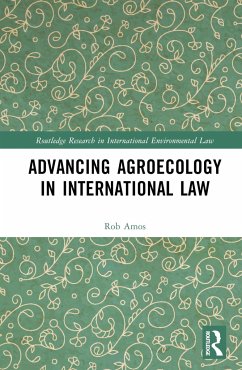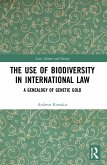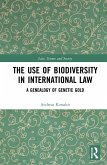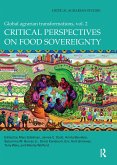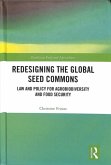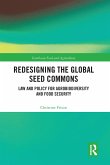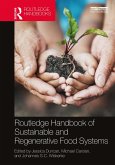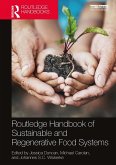Producing enough food is a basic human priority and a critical challenge in the face of a growing population and the deteriorating ecological health of the planet. Modern agricultural practices promise to maximise the productive efficiency of available land but are one of the main drivers of agro- and biodiversity loss. Agroecology, which places ecological sustainability and diversity at the heart of agriculture, is one response to these challenges. It presents agriculture not only as the process through which food is produced but as a dynamic socioecological phenomenon that exists through networks comprising natural and human stakeholders at global, national and subnational levels. Drawing on a combination of agroecological and legal literature, this book explores where there is space in international law to pursue agroecology. Using a range of case studies, it demonstrates how concepts, mechanisms and regulatory approaches in the law advance, and can be reformed to further advance, an agroecological legal framework that allows humanity to meet its agricultural needs in a way that protects the natural and cultural diversity that is fundamental to the ecological integrity of the planet.
Rob Amos makes an important and timely intervention on the impacts of agriculture on biodiversity at a time of planetary crisis. His creative approach and justification for international law's facilitation of agroecology recognises the importance of reconceptualising how humans, and law, interact with the environment.
Dr Emily Webster, University of Cambridge (UK)
This is a much-needed work on a hugely important topic. Through carefully selected case studies, Advancing Agroecology in International Law provides a thought-provoking and detailed analysis of the ability of international legal frameworks to support a transition to agroecology. It is essential reading for anyone interested in creating food systems that feed us while also sustaining the planet.
Dr Helena Howe, University of Sussex (UK)
Rob Amos has produced a work of rigorous and measured scholarship on a topic that implicates us all: the deeply-rooted interconnections between global agriculture, the global environment, and international law. His case study on the climate crisis's impacts on Kiribati is both a cautionary tale and a convincing argument that the agroecology framework can help map a way forward.
Prof. Mehmet Konar-Steenberg, Mitchell Hamline School of Law (Minnesota, USA).
An in depth dive into international law and what this means for agroecology. From clearly defining legal concepts to highlighting conflicting policy goals, Rob Amos's case studies allow us to understand and question how international law may help encourage agroecological systems.
Ellen Fay, Executive Co-Director of the Sustainable Soils Alliance (SSA)
Dr Emily Webster, University of Cambridge (UK)
This is a much-needed work on a hugely important topic. Through carefully selected case studies, Advancing Agroecology in International Law provides a thought-provoking and detailed analysis of the ability of international legal frameworks to support a transition to agroecology. It is essential reading for anyone interested in creating food systems that feed us while also sustaining the planet.
Dr Helena Howe, University of Sussex (UK)
Rob Amos has produced a work of rigorous and measured scholarship on a topic that implicates us all: the deeply-rooted interconnections between global agriculture, the global environment, and international law. His case study on the climate crisis's impacts on Kiribati is both a cautionary tale and a convincing argument that the agroecology framework can help map a way forward.
Prof. Mehmet Konar-Steenberg, Mitchell Hamline School of Law (Minnesota, USA).
An in depth dive into international law and what this means for agroecology. From clearly defining legal concepts to highlighting conflicting policy goals, Rob Amos's case studies allow us to understand and question how international law may help encourage agroecological systems.
Ellen Fay, Executive Co-Director of the Sustainable Soils Alliance (SSA)

